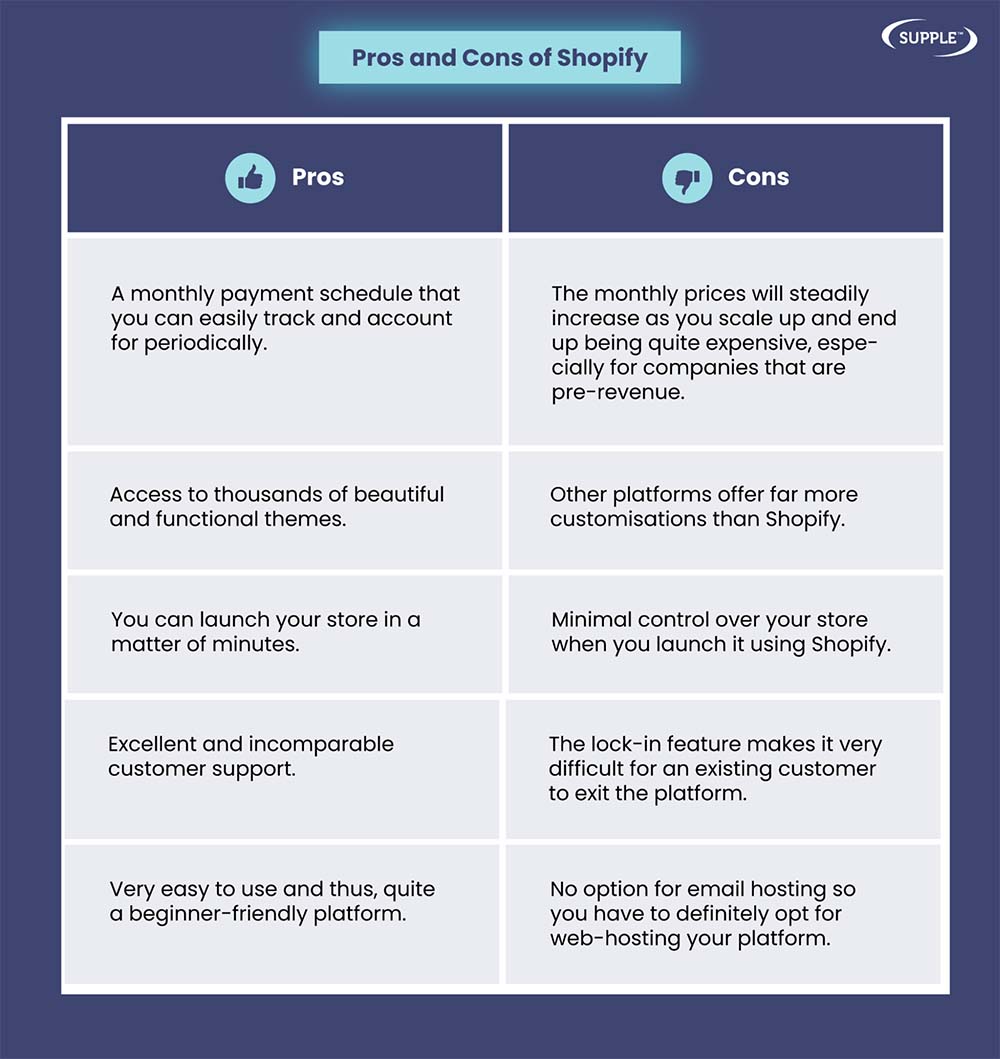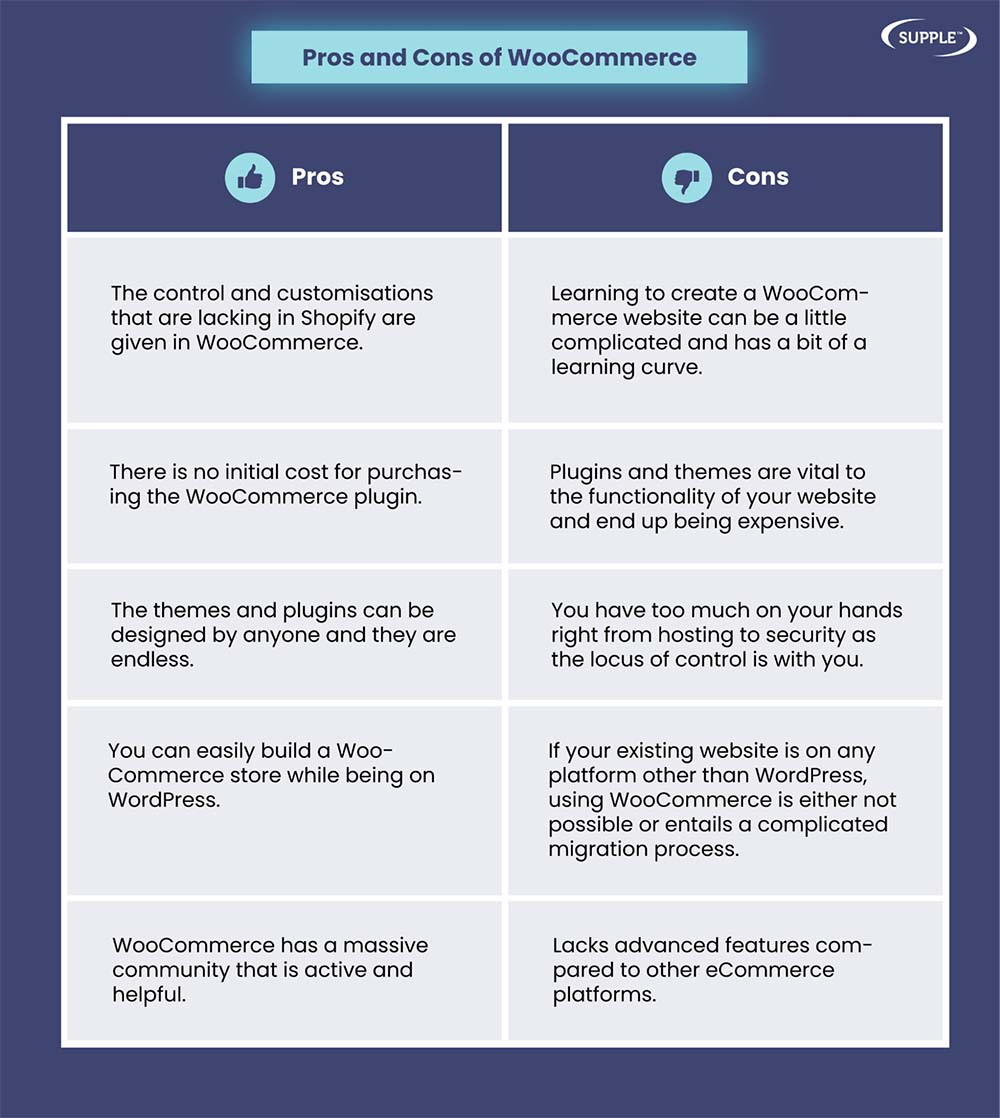WooCommerce vs Shopify: What You Need to Know
If you have already decided to launch your online store, well done! You are on the right path, considering the gargantuan growth that the eCommerce industry has experienced over the past decade.
But now comes the time to take an important decision — which eCommerce platform are you using to design your website?
WooCommerce and Shopify, are undoubtedly the two top choices in this regard.
WooCommerce is an open-source eCommerce plugin by WordPress that allows you to create a fully functional website in no time. Shopify, on the other hand, is a full-fledged website builder that you can use to design and deploy powerful eCommerce websites.
Apart from this simple distinction, it is quite difficult to decide which one you should choose to build your online store. And that is exactly what we are here for — to discuss and hopefully make it easy for you to choose between Shopify vs. WooCommerce.
Let us get started.
Identifying the Pros and Cons
Well, how do you evaluate and compare two powerful choices, if not by listing down their pros and cons? That’s exactly what we want to do with these two CMSes — both equally known and respected for their prowess as eCommerce website platforms.
Let’s take a look at the common pros and cons associated with Shopify first.
Pros and Cons of Shopify
Pros and Cons of WooCommerce
Now we will evaluate the pros and cons associated with WooCommerce — the popular eCommerce plugin designed by and for WordPress.
Now that you know the pros and cons of the two eCommerce platforms, you may have a better idea of what would work better for your online store. But wait — let us also look at the differences between them so that your decision becomes even easier.
WooCommerce vs. Shopify: How Are They Different?
If you ask any business owner, who has used both platforms, the differences between the two platforms are way too many to count. However, when you boil it down to the core differences, there are only a handful of aspects that can put the debate of WooCommerce vs Shopify to rest.
So, if you have already gone through all the reviews online, understand the pros and cons of both platforms and still find yourself confused — worry not — keep reading and understand the primary differences that we will now discuss in detail.
WooCommerce vs. Shopify SEO
If you are backing an eCommerce website, investing in SEO is not exactly optional. Filling your inventory with high-quality products is of no use if you are not able to bring prospective customers who are likely to buy them.
When we compare the performance of Shopify vs WooCommerce SEO, it is clear that both platforms go to great lengths to offer great SEO features for eCommerce businesses.
For starters, WooCommerce has been built using a code that is optimised for SEO. What’s more, WooCommerce offers a wide range of SEO plugins and seamlessly integrates with WordPress. The platform offers several SEO features such as customisation of URLs, SEO guides and prompts along the way.
Both — Shopify and WooCommerce offer many plugins, integrations and extensions that can help you boost the visibility of your eCommerce store on the SERPs.
Now, Shopify has several SEO plugins that serve different purposes in your strategy. You can install them easily to assess the SEO health of a piece of content that you are publishing. You can also set the titles and meta descriptions for web pages, images and even product descriptions with the help of Shopify SEO features.
You can also use SEO metrics to measure the search engine performance of your content and website and find potential areas of improvement.
Now, when you compare Shopify SEO vs WooCommerce SEO, it is clear that WooCommerce wins the race by a narrow margin due to the sheer number of apps and plugins it offers for search engine optimisation.
Plugins and Integrations
You can never have too many plugins and integrations backing your eCommerce website. After all, these are the features that actually help you differentiate your online store from thousands of others that you are competing with.
The apps that both platforms offer can help you elevate the look and feel, as well as the performance of your website. While WooCommerce offers more than 50,000 apps, Shopify offers over 1200 free apps for this purpose.
Your decision to install a specific plugin or app should, of course, depend on the ratings and reviews associated with it.
Nevertheless, the winner in this aspect is clear — it is WooCommerce. With a significantly higher number of apps and integrations, WooCommerce ends up being a more robust platform in this regard.
Security
Your eCommerce store can offer all the glitz and glamour that a customer might need (or not), and even have products flying off the virtual shelves at an amazing velocity. But if a customer is not able to trust your website to keep their personal information secure, then none of it matters.
According to research conducted in 2020, 34% of retailers list concerns regarding cyber security as the biggest challenge facing their business.
Naturally, any eCommerce platform will have security features at the top of its priority list. Shopify, being a full-fledged platform, is responsible for ensuring the security of websites that are built using it. Thus, it provides some necessary security features including an SSL certificate — a necessary measure to show people that the website that they are on is safe.
In fact, with this built-in security feature, and the many plugins available to offer additional security, Shopify becomes one of the most secure and preferred eCommerce platforms in terms of security. And remember — higher security directly translates to higher sales.
When compared, WooCommerce being a plugin does not offer the kind of built-in security features that a platform like Shopify does. This does not mean that you have no way to secure your website if you choose WooCommerce. There are plenty of additional plugins that will help you safeguard your website from hackers.
Additionally, you can also show your customers that your webpage is secure with the help of a SafeSearch Bookmarklet.
A great example is a plugin — Sucuri security suite, which secures all the core files and plugins of your website, and lets you know about a threat immediately. Nevertheless, a significant amount of work goes into finding, installing and configuring the plugin into your website.
Sales Features
Whether you choose Shopify or WooCommerce, you can rest assured that your goal of having an effective online store will be accomplished. However, when you compare the standard features offered by both platforms, there is a definitive difference.
Multichannel Selling
Want to sell on major platforms such as Amazon, eBay or Facebook? Both platforms will allow you to do so seamlessly. The only difference is that WooCommerce charges you for installing these platforms, and Shopify lets you start selling on these platforms without any additional charges.
Shipping
When it comes to shipping, WooCommerce and Shopify offer a bunch of features that will allow you to ship products to your customers without any major hiccups. However, Shopify is able to do so more smoothly by partnering with companies such as USPS, DHL Express, Canada Post and more, saving a lot of time and effort for you.
Recovering Abandoned Carts
According to a study by Baymard Research, over 69.5% of eCommerce shopping carts are abandoned. Not every customer who is browsing an eCommerce website will complete their purchase right then. Some might want to add products to their carts and buy them later. Making it difficult for customers to do so, can lower the amount of revenue that you can generate.
With that in mind, a major feature that works against WordPress WooCommerce vs Shopify is abandoned cart recovery. While Shopify offers abandoned cart recovery as a standard built-in feature, you will need to purchase and install an additional plugin for this purpose in WooCommerce.
The Shopify plugin sends out gentle reminders to customers who have abandoned their carts and invites them to finish their purchases. In case, you are wondering why this matters so much — companies lose more than $18 billion in sales by abandoned carts.
The clear winner among the two in this regard is undoubtedly Shopify. With no need for additional extensions or plugins, you will be able to effectively convert abandoned cart opportunities into sales.
Payment Options & Methods
Regardless of how many payment methods you offer, remember that customers are on a constant lookout for a faster, and more convenient payment option.
So the more payment methods you support, the more lucrative you become for your customers.
Considering this factor, Shopify and WooCommerce support multiple payment gateways. Unless your customer chooses a niche payment method that is rarely supported, you will be able to offer them their preferred payment option without any extra hassle.
WooCommerce supports the most popular payment gateways such as PayPal and Stripe and even some of the regional gateways. For other options, you may need to install an additional extension.
Whereas Shopify has its payment gateway eliminating any need for additional configuration. However, if you opt for an external gateway, the platform will charge an additional transaction fee. WooCommerce too has its payment gateway, however, does not charge an additional fee for transactions unless levied by your bank or payment gateway provider.
User Friendliness
If you are just starting in the eCommerce space and have minimal experience dealing with the backend of an eCommerce website, Shopify is a great option.
Since it is a hosted eCommerce platform, a lot of technical aspects related to the functioning of a website are easily taken care of. Plus, with Shopify, you don't need to get your hands dirty with installation, management and updating of software. With all of this convenience at your fingertips, the platform makes it quite easy for you to run your online store even without too much technical know-how.
On the other hand, WooCommerce requires you to do some legwork, to get your online store up and running smoothly. For starters, you will need to source your web hosting and security, so right off the bat, you will need to make some highly technical decisions. Plus, users have repeatedly shared that WooCommerce has a far more steep learning curve compared to Shopify.
But worry not — if you have already made up your mind about going with WooCommerce, all of the technical aspects can be dealt with quite easily. It offers highly detailed comparisons between various plugins and hosting providers to help you make your decision.
But if you ask us about user-friendliness, Shopify wins by miles due to its accessibility to non-technical people, and knowledge requirements.
Customer Support
We have all seen this before — a platform promises to be all that you are looking for, but when you need help, it is impossible to get in touch. Sounds like a tragic romance, but it's true!
In the case of Shopify, you are likely to need lesser support considering the platform is that easy to use. However, if you do need some additional guidance or support, the platform offers a dedicated help centre, which features several guides, blogs, and tutorials to help you navigate features and add functionality.
Additionally, Shopify offers 24x7 customer support on phone, live chat, and email.
By contrast, if you use WooCommerce directly, you can reach customer support by generating tickets for general queries. Other than this, there are various setup guides and articles that you can find to help you build your online store.
However, you have the option of choosing a hosting provider. This will give you access to a fantastic support centre and a plethora of articles and guides to help you with your online store setup journey.
The Bottomline
We hope reading this piece helped you make a more informed decision on the platform that you would like to get behind. If you read the entire piece, it may be clear to you that there are no clear winners when we are debating WooCommerce vs Shopify. Your choice of eCommerce platform depends on your priorities.
If round-the-clock customer support, superior sales features and in-built security are your top priorities, Shopify is your answer. But if you rely heavily on content, and want more control over your website, then WooCommerce may be the better option for you.
Regardless of the platform you choose, if you want to ace your SEO game, get in touch with us! We have offices in Sydney, Melbourne, and other locations across Australia.
DIGITAL MARKETING FOR ALL OF AUSTRALIA
- SEO AgencyMelbourne
- SEO AgencySydney
- SEO AgencyBrisbane
- SEO AgencyAdelaide
- SEO AgencyPerth
- SEO AgencyCanberra
- SEO AgencyHobart
- SEO AgencyDarwin
- SEO AgencyGold Coast
- We work with all businesses across Australia




